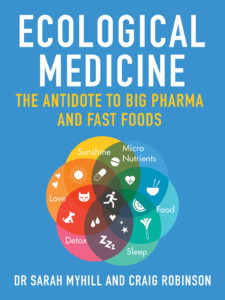It’s fair to say pharmaceutical companies are not well liked these days. With astronomically high drug prices and the over-prescription of drugs being directly linked to the origins of the opioid crisis, it’s little wonder that a 2019 Gallup survey found the pharmaceutical sector is the most loathed industry in the country. So why do we still rely so heavily on Big Pharma? And should we be worried about some hidden damage it is wreaking? WellWell tried to find out when it recently spoke with Dr. Sarah Myhill, the author of Ecological Medicine: The Antidote to Big Pharma and Fast Foods. She provided her take on why big pharma ignores some issues in search of profits and how consumers are paying a physical price when symptoms are suppressed rather than treated.
Ecological Medicine focuses on the root causes of disease to treat them through more practical and natural means such as, diets, supplements and stress management. How does that counter how big pharma operates and what it recommends?
It’s very simple. Conventional medicine and big pharma are not concerned with disease causation, they primarily focus on suppressing symptoms, usually with drugs. So if someone has arthritis, the big pharma route will recommend a series of painkillers, anti-inflammatories and immunosuppressant drugs. They may even get surgery and show progress, but their general health would rapidly go downhill.
 How would their health go downhill?
How would their health go downhill?
Symptom suppressant is dangerous business. We have symptoms for a reason. They protect us from ourselves. If you ignore symptoms or try to mask them, the underlying pathology will accelerate. It’s short term gains but long-term pain because the whole thing degenerates. And, of course, so much of it is driven by big pharma because it’s the most financially rewarding arrangement for them.
You’ve written excessively about the Paleo-ketogenic (PK) diet. How is it uniquely beneficial towards combating symptoms at their root cause?
The vast majority western pathology results from poor quality diets, which are high in sugars and carbohydrates that allow infections to gain access to our bodies and the PK diet works counter to this. It’s low carbohydrates and almost entirely devoid of sugars.
What are some of the misconceptions that still remain based on sugar and how much of it is in our food and what it’s doing to our bodies?
The fundamental misconception is that sugar gives you energy. I remember when I was a child a famous slogan was, “One Mars Bar a day lets you work, rest and play” and that’s just a chocolate bar full of sugar. The other point often missed is that sugar is an addiction. It gives the short-term relief of symptoms because it gives us an ample burst of energy which allows us to excuse things and then you get withdrawal symptoms. Some use sugar as comfort food, equally used as an addiction to ease stress. So, the more you have, the more you need. It is just like an alcoholic or a smoker.
Another aspect of the PK diet is the focus on gut health. What is the crucial role that your gut plays in overall health?
It’s central to almost everything. The gut is, first of all, a source of fuel. It provides energy for movement, the raw materials for healing and repair, and the vitamins and minerals for enzyme function. I don’t think I can emphasize strongly enough how wide-reaching the gut is and how often problems start there.
Similarly, Ecological Medicine emphasizes the importance of consistent healthy sleep. How crucial is sleep towards not only fighting off disease but overall health?
It’s just as important as diet. If you deprive somebody of sleep for 2 weeks, they would be dead. It’s absolutely fundamental to life. There is no biological system in the world that doesn’t require a period of shut down to repair. For many health issues, you’ve got to have a package properly in place to encourage full, sustainable recovery. I mean, lack of sleep is a huge risk factor for suicide, cancer, heart disease, and dementia because during sleep the body and its immune system heals. Sleep is vital.
So how did we get into this of reliance on pharmaceuticals? Most of these drugs are peer reviewed, tested by medical doctors. Why are they not focused more on diets for health?
It’s very simple, follow the money. Fast food is cheap carbohydrates dressed up in a way that is addictive, and the more addictive substances put in there, the more people are going to eat. A lot of money is made off cheap carbohydrates and that generates pathology for which a lot of money is made on medication. It’s good business for people to be unhealthy.
Do you see any improvement or change in the way doctors, big pharma or even individuals approach personal health?
There is more information out there and people are certainly more aware of taking better care of themselves. A lot of doctors and medical professional are beginning to shift their take on wellness as well, even if it is only marginal. Big pharma? That’s going to take a while for them to change. There is just too much money involved.
 About Dr. Sarah Myhill
About Dr. Sarah Myhill
Sarah Myhill is a general practitioner who has treated over 10,000 people with Chronic Fatigue Syndrome. She has written multiple books on topics including Chronic Fatigue Syndrome, the PK Diet, sustainable and ecological medicine, and infectious disease prevention.
Learn More at www.drmyhill.co.uk












